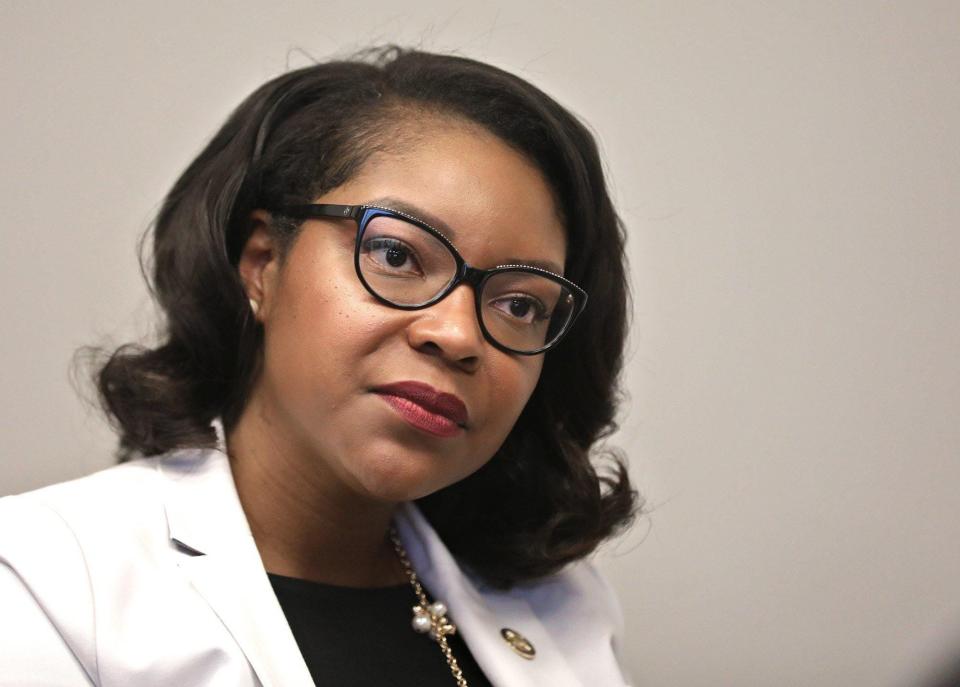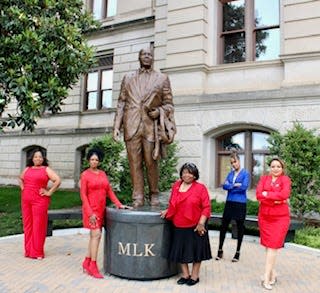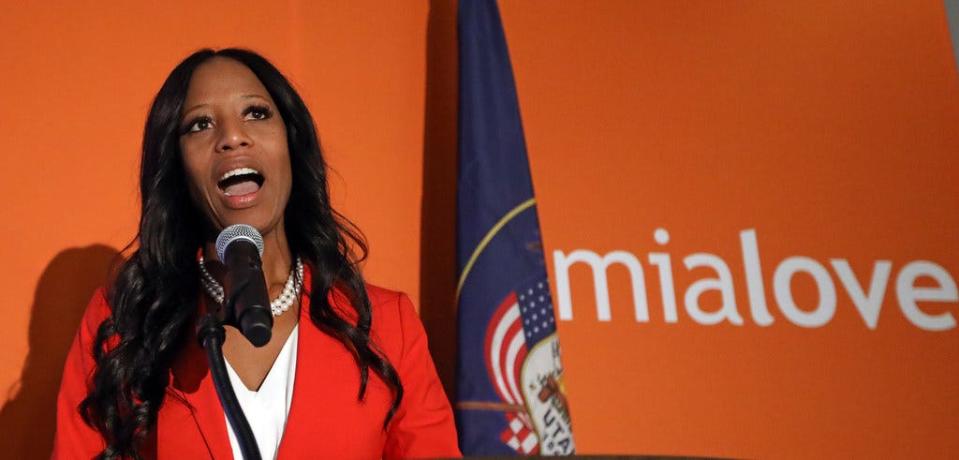'People ought to get used to seeing us': More Black women are running for office
WASHINGTON — Ohio state Rep. Emilia Sykes joined five other Black women in a rented home in Martha’s Vineyard last summer to map out fundraising strategies for their next bids for office. The state lawmakers – some from as far away as Oregon and Tennessee – talked with experts about how to ramp up their social media, navigate grueling campaigns and squeeze in time for self-care.
“I had a different pep in my step,’’ said Sykes, recalling how she felt when she left the three-day retreat. “When you go into these battles you want to know you’re not doing it alone.”
Sykes is the co-founder of “Seated Together," an advanced training initiative for Black women serving in elected offices and part of a growing effort to better train, support and encourage more Black women to jump into the political arena.
The efforts come as more Black women are running for governor, statewide offices and Congress. Many of the training programs are geared toward Democratic candidates, but some Republican women’s groups say they’re boosting efforts to diversify their pool of candidates.
Black women, who are underrepresented in elected offices, often need more support to overcome systemic racism and barriers that can make it harder for them to raise campaign dollars, win over voters and even summon the confidence to enter a race, experts said.
“Some organizations are kind of doubling down on their efforts,’’ said Wendy Smooth, associate professor of women’s, gender and sexuality studies at the Ohio State University. “Everyone is recognizing the sheer power of the leadership of Black women and women of color more broadly. For Black women, they’ve been long in this work around political organizing and mobilizing voters and we are now seeing a greater interest in actually running for office.’’
Groups prepare Black women to run
To overcome the disparity gap in political representation, more groups, many of them new, are investing heavily in training programs for women of color, said Glynda Carr, president and co-founder of Higher Heights for America, which among other things, runs nonpartisan training programs for Black women running for office.
The group offered virtual training during the pandemic and rolled out its first fellows program in 2020, a seven-month leadership program for women involved in civic work. The 30 participants included political staffers, policymakers, lawmakers and grassroots activists. Another session is planned for early next year. Higher Heights also hosted a one-day virtual boot camp and a leadership series last year, where women learned about fundraising and organizing a campaign.
Carr said her group is one of several Black-led political and advocacy groups that didn’t exist a decade ago. Others include Collective PAC, Black Voters Matter and BlackPAC.
“This has been 10 years in the making,’’ said Carr, whose organization launched in 2012. "Collectively, the organizations like our organizations have built for this moment. And what we've built for this moment is a record number of Black women interested in running for office and a record number of Black men running.’’
Many training programs are tailored to local communities and states.
Emerge, a national program that supports and trains Democratic women running for office, has chapters across the country. The organization has 1,000 alumni serving in elected offices, including U.S. Rep. Lucy McBath, a Black Democrat from Georgia. Emerge teamed with Sykes to develop "Seated Together.'' The next cohort is planned for the fall.
One of the "Seated Together'' participants, London Lamar, a Democratic state representative from Tennessee, was appointed interim senator earlier this month to fill a vacancy.
“That was just really exciting,’’ said A’shanti Gholar, president of Emerge and founder of the podcast “The Brown Girls Guide to Politics.” “And she felt comfortable and ready for it, to take that next step.’’
Other groups are targeting Black women involved in civic engagement and grassroots organizing.
This week, the Ohio affiliate of Ready to Run and the Ohio Unity Coalition's Black Women's Roundtable, is launching BOSS (Black Ohio Sisters Strategizing) For Change, a one-day virtual program, including sessions on media and digital strategies, building a campaign infrastructure and protecting voting rights.
The national group Vote Mama doesn’t have a formal training program, but endorses, mentors and funds Democratic mothers who have children under 18 years old.
Nearly 74% of the 50 or so successful candidates the organization endorsed last year were women of color, said Liuba Grechen Shirley, founder and chief executive of Vote Mama.
It's important to elect more Black mothers, who have different lived experiences than many legislators, said Grechen Shirley. “If you have a lot of old white men in office, you have a completely different legislative priority,” she said.
In New Jersey, the Center for American Women and Politics at Rutgers University host its Ready to Run training program. More than half the participants are women of color. And its Run Sister Run program provides an opportunity for Black women lawmakers in New Jersey to network and discuss challenges.
The center is also working with the National Organization of Black Elected Legislative Women to host another training program for 2023.
“This work needs to happen for Black women, for Latinas, for Asian women, for Native women. Those voices need to be at the table," said Debbie Walsh, director of the Center for American Women and Politics. "It takes intentionality for this kind of change to happen.’’
More: Black women candidates for Congress say they're reclaiming their time

Organizers said women of color have asked for more programs tailored to them and their communities. For example, they asked for sessions that included cultural and regional references.
“We cannot take the playbook that white men use and think that we're going to be successful,’’ Sykes said.
Earlier this month, Higher Heights endorsed 10 Democratic women running for Congress, including Sykes. It expects to support a record number of Black women candidates this year.
Carr, of Higher Heights, said Black women are looking for programs that include trainers who look like them and provide a "safe space'' to share concerns.
“We're preparing a pipeline of Black women ready to lead across this country in districts that historically people would have discounted us in,’’ said Carr, noting some are running in predominately white districts. “That's normalizing Black women's leadership, which means that the possibilities of where Black women can run has expanded.”
More: Black women's groups exercising new political power going into 2020 presidential campaign

GOP urged to recruit more Black women
Higher Heights and other groups have called out Democrats for not supporting Black women candidates early. Republicans also need to step up support, they said.
“Black women aren't a political monolith,’’ Carr said. “Black women who identify or are active as Republicans should have access and should not … be discouraged from running for office.”
There are no Black Republican women in Congress, but a record number are running, Carr said.
“There’s work to be done – on both sides of the aisle,” she said.
Some Black women Republicans agree.
“People like the idea of women running, they do, especially a woman of color, but the efforts don’t go far enough,’’ said former Utah Rep. Mia Love, who served from 2015 to 2019 and was the first and last Black GOP woman in the House. “I certainly hope that I won’t be the last one. I really do.”
Love said House Republican leaders, including Kevin McCarthy and Paul Ryan were supportive when she was elected to Congress in 2014. But, she said, the party falls short when it comes to letting women lead on issues that matter to women, including health issues, reproductive health and immigration.
“As a daughter of immigrants, I should have been leading that,’’ said Love, whose parents are Haitian. “I think the messenger counts.’’
Love, who is the national outreach director at the Utah State University's Center for Growth and Opportunity, said she has supported some Black GOP women running for Congress through her political action committee.
Eileen Sobjack, president of the National Federation of Republican Women, said part of the membership committee’s mission is to recruit more young people and women of color. More than 800 people registered for the federation’s virtual recruitment program earlier this year.
“We educate them, give them the tools and urge them to run," Sobjack said.
Sobjack noted federation members of color serve in Congress: Rep. Yvette Herrell of New Mexico, who is Native American, and Reps. Young Kim and Michelle Steel, who are both Asian American and from California.

Vivian Childs, who served two years as chair of the federation’s diversity committee, is running for the 2nd congressional seat in Georgia. Childs, a minister and author, said the committee hosted virtual meetings to recruit women and bring them together.
“There's one thing I've noticed about running, oftentimes you feel alone, especially when you look like me,’’ said Childs, who is a Black woman. “I'm just going be honest with you: The resources don’t seem to be at your fingertips as they are for others.’’
Childs, also the immediate past chair of the Georgia Black Republican Council, welcomed last week an endorsement from Maggie’s List, a political action committee that supports conservative women.
Still, she said, it’s important for Republicans to support women candidates earlier and set up a national training program. Childs said she’s been involved in politics a long time and may not need as much help as newer Black women candidates, but it should be available.
“I'm well equipped to get us to the finish line,’’ she said. “I just need to do a better job of making sure that everyone else knows that I'm equipped and qualified.”
Kamala Harris inspired more Black women to run
Black women have long been mobilizing voters and supporting candidates, but more are starting to see themselves as candidates, said Smooth, of Ohio State University, whose research explores that ecosystem.
Smooth noted the “coattails effects’’ of Vice President Kamala Harris, the nation's first Black vice president, and the rise of activists like Rep. Cori Bush, a Black Democrat from Missouri.
Much of the pipeline to Congress comes from state legislatures, where a record 31% of lawmakers are women, according to the Center for American Women and Politics. Of the 2,297 women in state legislators, 365 identify as Black.
“Is that enough? Absolutely not,’’ Walsh said. ‘’But those women are positioned well to make a run.’’
Black women make up nearly 13% of the nation's population and are disproportionately left out of politics. Eight Black women serve in statewide elected posts, 26 are in Congress and two are U.S. delegates. There are no Black women in the U.S. Senate. A Black woman has never been elected governor.
Black women candidates are hoping to make history this year.
Seven Black women, including Democrat Stacey Abrams in Georgia, have filed to run for governor, according to the Center for American Women and Politics.
So far, 12 Black women have filed to run for the Senate and Rep. Val Demings, D-Fla., has announced plans to run for the Senate. At least 54 Black women have filed to run for a seat in the House of Representatives. These figures could change as filing deadlines approach.
Experts said more Black women have also been inspired to run amid a push for more diversity in state legislatures and Congress in the wake of the 2020 death of George Floyd, an unarmed Black man killed by police in Minnesota, and the subsequent global debate on racism and racial inequity.
“It's about political empowerment and it's about not wanting to be on the sidelines and seeing the importance of being the people making the decisions,’’ Walsh said. “That's how you're going to get your issues paid attention to, you have to be at the table.”
'It's a never-ending fight'
Efforts to recruit more Black women candidates have worked, but there’s still resistance, said Melanie Campbell, president of the National Coalition on Black Civic Participation and convener of the Black Women’s Roundtable.
“We're breaking those barriers,’’ said Campbell, noting the election of Harris. “But we have to break them and keep the opportunity to own our power in a way that we don't keep getting this backlash.''
"It’s a never-ending fight,” she said.
Gholar, of Emerge, said she repeatedly hears from women that they still need support once elected and often face new hurdles.
“We know that when it comes to Black women even when you're getting in elected office you still have to fight harder,’’ she said.
Some complain they aren’t taken seriously by colleagues, don’t get equal time on the floor or aren't tapped for their expertise.
Sykes said even though she wears a pin signaling she’s a legislator, she’s sometimes stopped by security when she enters Ohio’s state capitol. She said one officer told her she didn't look like a legislator. There is a “little bit of truth'' to that, said Sykes, the youngest Black woman elected to the state Legislature.
“It was just these weird interactions and inappropriate interactions where there's a certain level of questioning of my presence in a place with so much authority and power,’’ said Sykes, who is 36.
Love, who is also a CNN commentator, said she faced challenges in Congress. She said she “ran circles around’’ others in her congressional delegation when it came to passing bills that benefitted her district.
“But the question was always, ‘Well, what has she done?’’’ she said. “Anytime I actually spoke people were surprised that I could actually deliver a decent speech. And I just kept saying, ‘Everyone I am educated. I have a college degree. What are you talking about?’”
Love said she was also questioned by both sides about her qualifications and whether she could be a good mother if she was away in Washington.
“I was targeted because I stood out,’’ she said. “But my work is not done. I'm able to go on CNN and I'm able to be a good reasonable voice on CNN. But again, there's not a pipeline.’’

'People ought to get used to seeing us'
Beyond structural barriers, Smooth said one challenge is convincing Black women that running could help address problems they’ve been fighting for.
“What I find is that for Black women and women of color in general, they're usually not in politics just for the heck of it,’’ she said. “They're problem-solving. They're strategizing. They're trying to bring advancement for their communities and for their states.”
Many are activists.
‘We need activists on the outside banging on the door,’’ Smooth said. “And we also need people sitting at the table.’’
In the months since Sykes and other Black legislators met last summer, they have connected regularly to discuss issues, including fundraising strategies and social media plans. In December, Sykes decided to run for Congress to represent Ohio's 13th District.
“Half the battle is just having the confidence to try,” she said.
The group vowed to help with fundraising and continue #webelonghere, a campaign to promote more Black women's involvement in politics.
It aims to show ''that Black women are city council members. We’re mayors. We’re state legislators. We’re congresswomen. We are vice presidents,’’ Sykes said. “We are all of these things and people ought to get used to seeing us.”
Follow Deborah Berry on Twitter: @dberrygannett
This article originally appeared on USA TODAY: More Black women run for Congress, statehouse seats inspired by Harris
